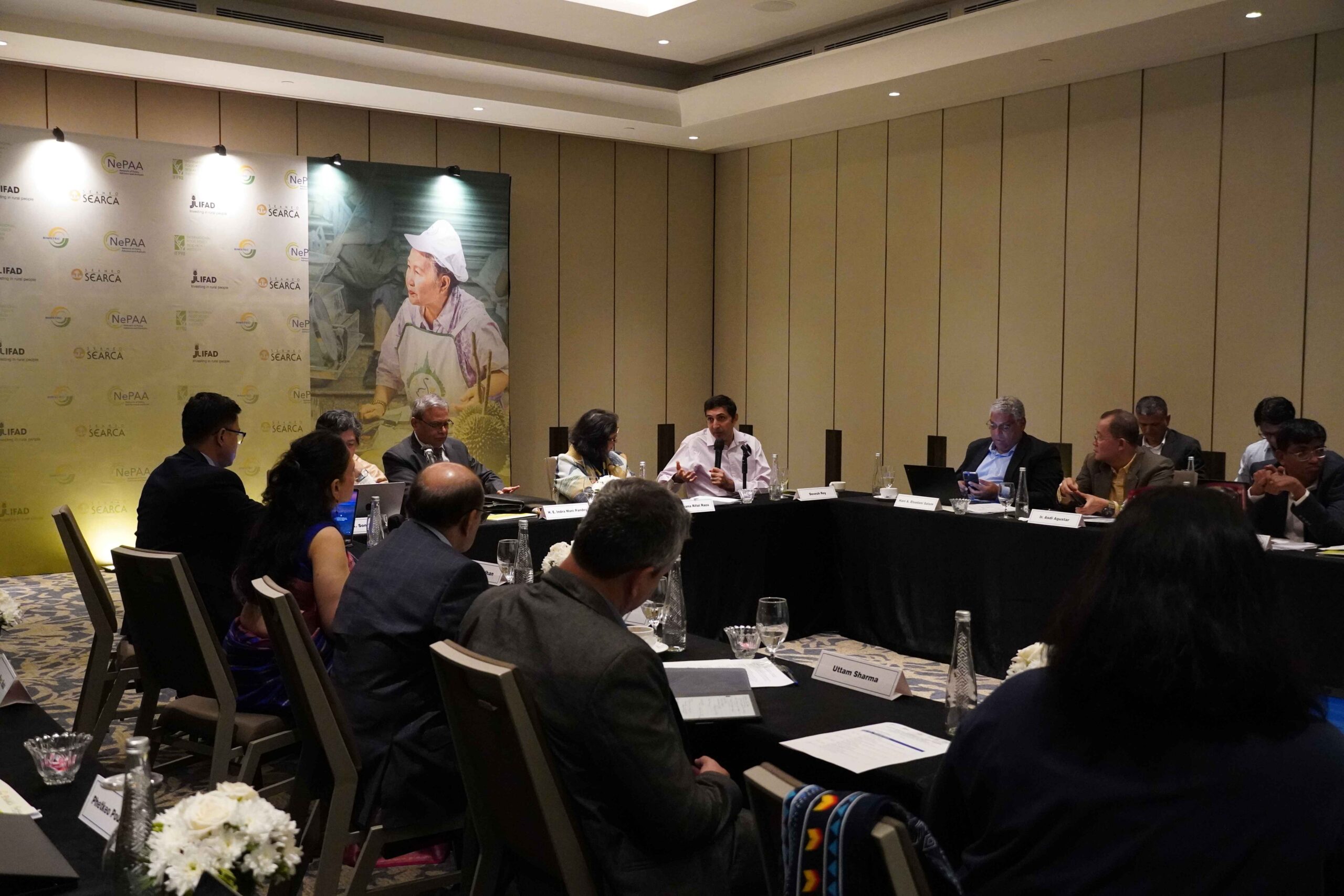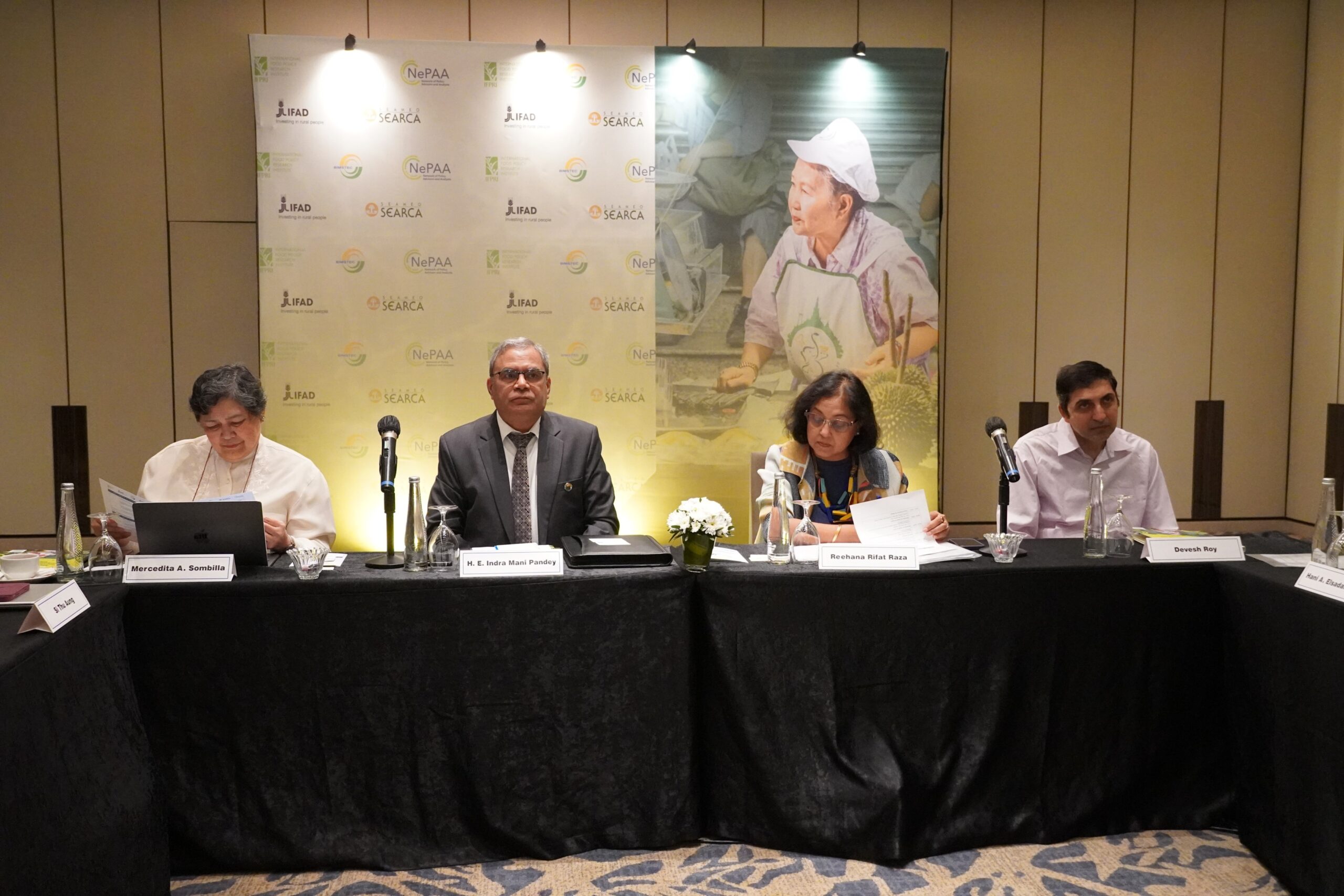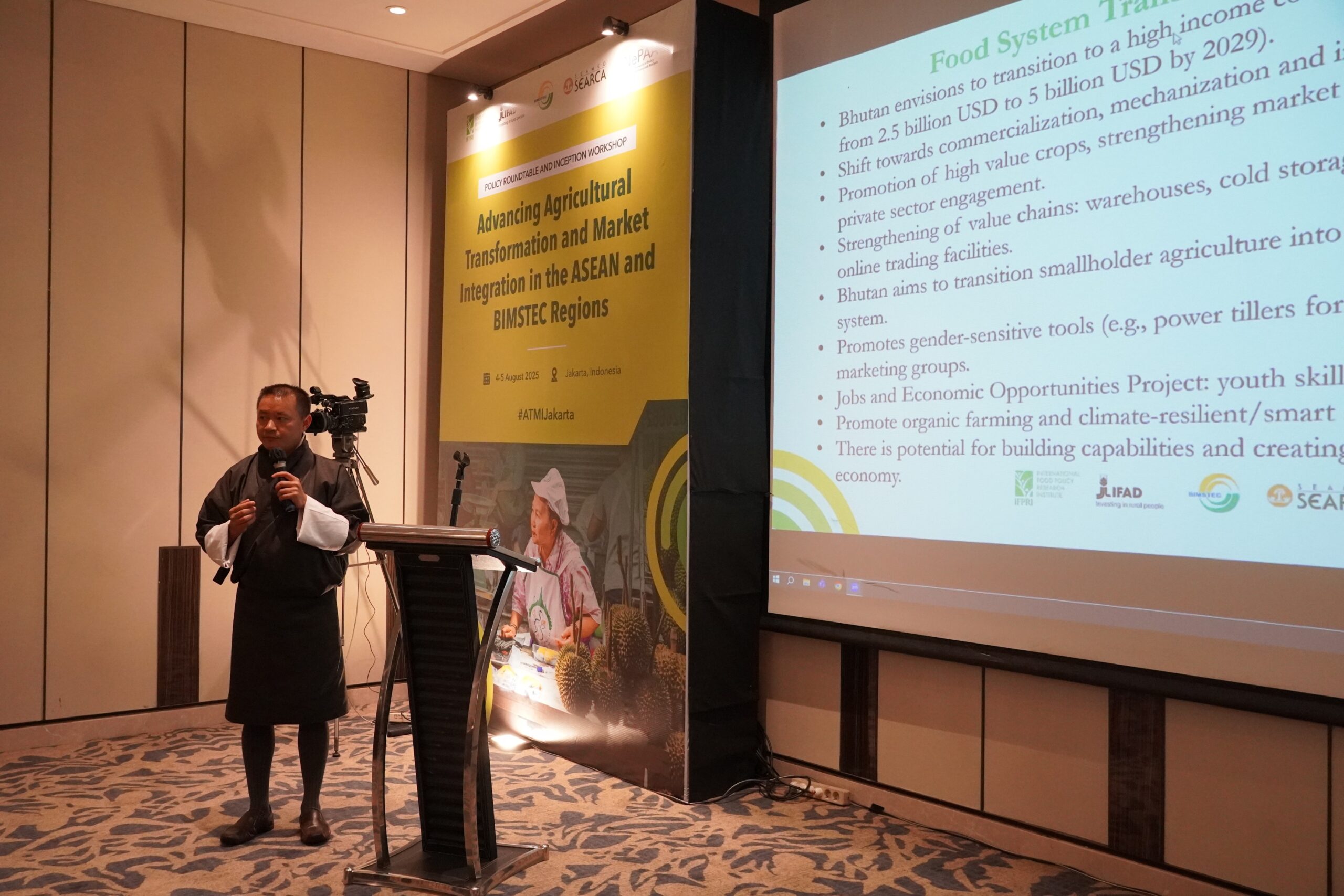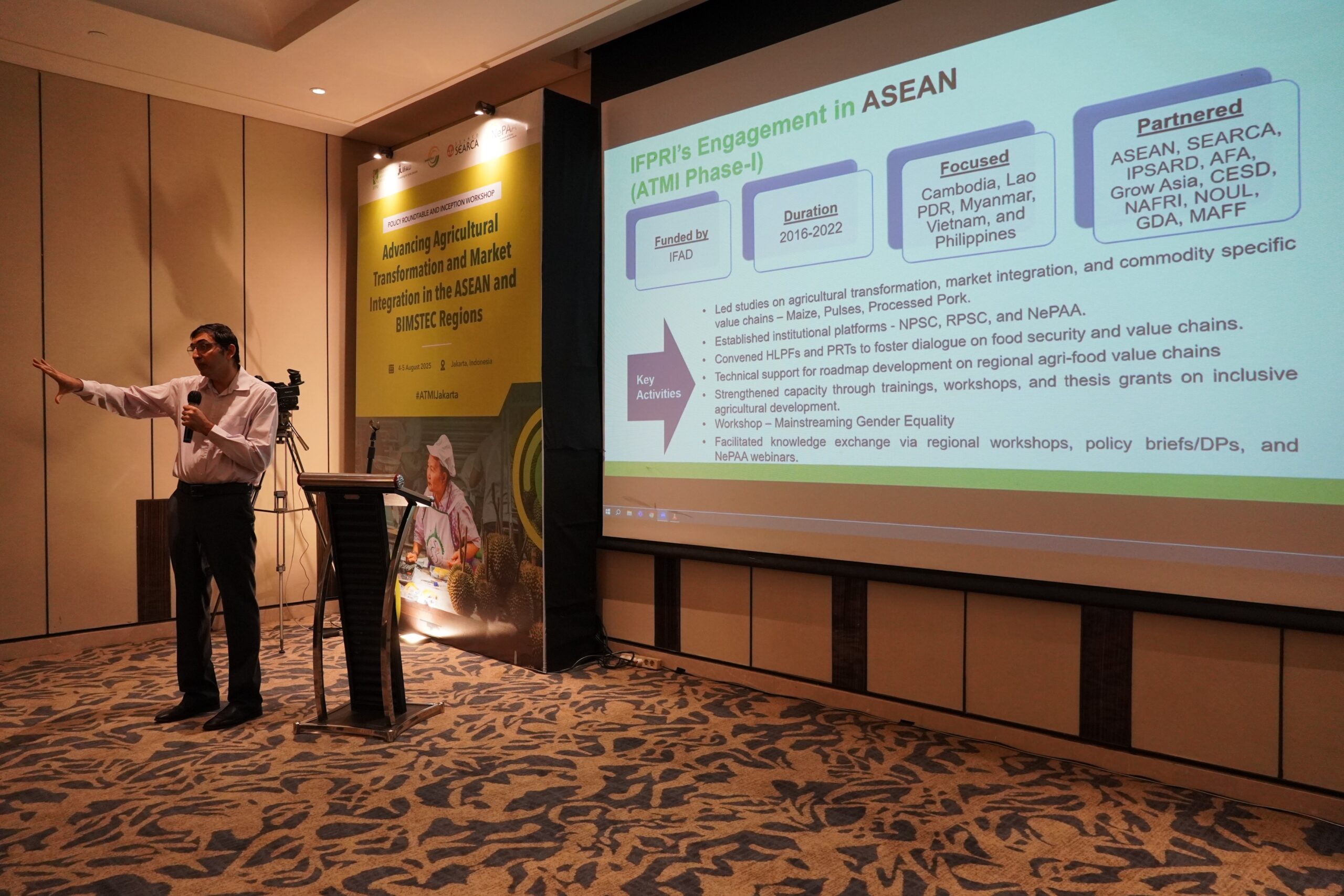The second phase of the Agricultural Transformation and Market Integration (ATMI-II) initiative was officially launched in Jakarta on 4–5 August 2025, marking an important step forward in strengthening inclusive, sustainable, and climate-resilient agri-food systems across Southeast and South Asia.
Convened by the International Food Policy Research Institute (IFPRI) in partnership with the International Fund for Agricultural Development (IFAD), the Bay of Bengal Initiative for Multi-Sectoral Technical and Economic Cooperation (BIMSTEC) and the Southeast Asian Regional Center for Graduate Study and Research in Agriculture (SEARCA), the event brought together over 30 senior representatives from governments, regional bodies, think tanks, and research institutions across the region. The integration efforts within both ASEAN and BIMSTEC remain ongoing and adaptive. ATMI Phase 2, through the Network of Policy Advisors and Analysts (NePAA), introduces a distinctive platform for advancing regional dialogue and policy coordination.
A timely conversation in a complex landscape
The launch came at a time when agri-food systems in Asia are undergoing rapid transformation, shaped by shifting trade dynamics, evolving consumer demands, climate impacts, and the need for inclusive growth. While both ASEAN and BIMSTEC regions face unique challenges, they share common priorities - addressing sustainability concerns, strengthening food security, and creating opportunities for smallholders, women, and youth.
Jakarta provided the ideal setting for these conversations. As the ASEAN Secretariat’s home, and a meeting point for stakeholders from both regions, the city served as a bridge between different perspectives and policy frameworks, particularly the integration ambitions of ASEAN and the food security and resilience mandates of BIMSTEC.
The alignment of ASEAN’s integration objectives with BIMSTEC’s focus on food security and resilience represents a noteworthy development in regional cooperation. Together, these two influential associations span nearly 2 billion people and a combined GDP of $4.5 trillion, underscoring the scale and potential impact of their collaboration. Support from member states highlights a shared commitment to long-term regional goals. This initiative reflects the sustained efforts of both organizations and the constructive role played by their secretariats in bringing it to fruition.

Setting the tone
The opening session featured strong messages from leaders across the partner institutions.
ASEAN Secretary-General Dr. Kao Kim Hourn underscored the importance of collaboration across borders to advance resilient food systems. “Regional cooperation – grounded in shared values, mutual respect, and sustainability – is essential to addressing both immediate and long-term challenges in food and agriculture. Initiatives like ATMI-II are timely and vital in supporting this transformation,” he said. BIMSTEC Secretary-General Indra Mani Pandey added that “the ATMI Phase II will provide substantial benefits to the member States of both ASEAN and BIMSTEC in addressing the various challenges they face in ensuring food security and structural transformation of agriculture to make it climate resilient.”
From IFAD, Regional Director Dr. Reehana Raza stressed the potential of regionally embedded platforms like the Network of Policy Advisors and Analysts (NePAA) “as a sustained multi-country mechanism to support evidence-based policy across the region.”
SEARCA Director Dr. Mercedita Sombilla placed inclusiveness and sustainability at the center of transformation efforts saying, “The proposed activities of ATMI-II will be aimed at strengthening and empowering smallholder farmers, especially women and marginalized groups. It is our shared responsibility to ensure their voices are heard, their needs are met, and they are given the support required to thrive as we transform agriculture and the food system.”
IFPRI’s Director for South Asia, Dr. Shahidur Rashid, reflected on the continuity between ATMI-I and ATMI-II, highlighting that “the initiative builds on earlier work in advancing inclusive, sustainable, and efficient food system transformation in ASEAN, and now aims to institutionalize NePAA as a regional policy platform for sustained dialogue and shared learning.”

From dialogue to direction
The first day’s Policy Roundtable focused on the strategic direction for ATMI-II. Participants discussed smallholder inclusion, integration into regional and global value chains, and the design of climate-resilient agricultural policies. By the end of the day, several points of alignment emerged:
- A shared vision and operational approach for ATMI-II
- A draft action plan to strengthen and institutionalize NePAA as a long-term mechanism for cooperation
- Commitment to integrating environmental sustainability, social inclusion, and economic growth in policy frameworks
- Stakeholder-led refinement of research priorities and coordination mechanisms across participating countries
Diving Deeper
Day 2 of the Inception Workshop offered space for technical deep dives, with presentations introducing analytical frameworks for agricultural transformation and trade integration. Discussions emphasized that transformation today goes beyond productivity gains or crop diversification – it involves reconfiguring entire value chains, especially midstream actors such as processors and logistics providers.
Trade integration conversations similarly highlighted the shift from raw commodity exports to higher-value, branded products, alongside efforts to strengthen participation in and upgrading within Global Value Chains (GVCs). Key challenges identified included SPS compliance, informal cross-border trade, and high logistics costs.
A standout innovation was the BIMSTEC Agricultural Trade Monitor Plus (BATM+), a dynamic tool offering high-frequency, disaggregated trade data (HS-8 digit level) and policy insights, with potential for future expansion to ASEAN.


Looking Ahead
The workshop outcomes signal a promising and collaborative trajectory. With strong partner engagement and clearly defined priorities, ASEAN and BIMSTEC are well-positioned to deepen cooperation and build a more integrated, resilient Indo-Pacific. ATMI represents a meaningful step in this direction.
This collaboration seeks to enhance economic integration by leveraging each organization’s strengths and geographic proximity. More importantly, it offers a platform for robust South-South cooperation and mutual learning. Both ASEAN and BIMSTEC share a vision for regional development – where economic and social progress is driven by inclusive trade and integration
As Dr. Rashid noted, this initiative is not just about projects – it is about creating lasting institutions and platforms that can sustain dialogue and drive change over the long term. NePAA, with its growing network and expanding regional scope, will be central to this vision.
The inception reaffirmed NePAA’s role as a central platform for evidence-based policy engagement, emphasizing the need for clear governance, strategic resource mobilization, and strong ties to national and regional programs. Upcoming technical work includes GVC participation analysis, OSRM-based trade cost estimation, and inclusive food systems assessments – ensuring ATMI-II aligns with IFAD’s country priorities.
The conversations in Jakarta were not an end point, but the beginning of a renewed effort to connect policy, practice, and people across regions. As the initiative moves into its implementation phase, the challenge will be to translate the energy and alignment of the launch into tangible results for the millions who depend on resilient and inclusive agri-food systems.
Anisha Mohan is a communications specialist, Mamata Pradhan is a research coordinator, and Abul Kamar is a research analyst with IFPRI’s South Asia Regional Office.



